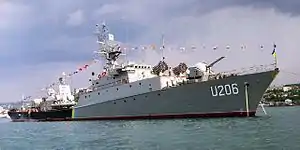Ukrainian corvette Vinnytsia
Vinnytsia (U206) is an anti-submarine corvette of the Ukrainian Navy. Prior to joining the Ukrainian Navy she was a former KGB Border Guard patrol ship named Dnepr. In March 2014, she was seized by Russian soldiers and de facto came under control of the Russian Black Sea Fleet. The ship was returned to the Ukrainian Navy from Crimea on 19 April 2014.
 Vinnytsia in 2016 | |
| History | |
|---|---|
| Name: | Dnepr |
| Builder: | Zelenodolsk Shipyard, Zelenodolsk, Republic of Tatarstan |
| Yard number: | 775 |
| Laid down: | 23 December 1975 |
| Launched: | 17 June 1976 |
| Commissioned: | 12 September 1976 |
| In service: | 31 December 1976 (Coast Guard) |
| Fate: | Transferred to Ukraine in 1996 |
| Name: | Vinnytsia |
| Namesake: | Vinnytsia |
| Acquired: | 1996 |
| Commissioned: | 19 January 1996 |
| Identification: | U206 |
| Badge: |
 |
| General characteristics | |
| Class and type: | Grisha II-class corvette |
| Displacement: | |
| Length: | 71.2 m (233 ft 7 in) |
| Beam: | 10.1 m (33 ft 2 in) |
| Draught: | 3.8 m (12 ft 6 in) |
| Propulsion: | |
| Speed: | 35 knots (65 km/h; 40 mph) |
| Range: | 2,500 nautical miles (4,600 km; 2,900 mi) at 14 knots (26 km/h; 16 mph) |
| Endurance: | 9 days |
| Complement: | 79 (9 chiefs) |
| Sensors and processing systems: |
|
| Electronic warfare & decoys: |
|
| Armament: |
|
Class and role
Vinnytsia is a 1124P project corvette (NATO reporting name: Grisha II class, Soviet classification: Albatros class Russian: Альбатрос).[1] In Soviet service she was designated as a Border Guard Patrol Ship, modified versions of the naval Small Anti-Submarine Ship design.
The Grisha-class anti-submarine ships were designed to search for and destroy enemy submarines found in coastal areas. They were equipped with a variety of anti-submarine warfare (ASW) weapons. All were fitted with retractable fin stabilizers. The Grisha II class were modified variants built for the border guard between 1972 and 1983.[2] These ships had a second 57-millimetre (2.2 in) gun mounting replacing the SA-N-4 missile system forward.[3]
Service
The corvette Dnepr was laid down on 23 December 1975 at the Zelenodolsk Shipyard, Zelenodolsk, Republic of Tatarstan. The ship was launched on 17 June 1976. The corvette was moved from Zelenodol'sk to the Sea of Azov along the Volga and Don. The corvette was initially based at Sevastopol for trials.
On 24 December 1976 an act was signed adding the ship to the Border Guard Service of USSR. The Soviet Maritime Border Guard flag was raised on the ship on 31 December 1976.
Service in the Coast Guard
Dnepr saw service throughout the late 1970s and into the 1980s, guarding the state border and the economic zone of the USSR and patrolling off the coast of the Crimean peninsula in the Black Sea.[4]
In 1977 Dnepr patrolled the Black Sea between Zmiinyi Island and the Kerch Strait. In 1978, the ship was assigned to patrol between Odessa Port and Novorossiysk Port. In 1979, her patrol area stretched from Cape Tarkhankut to Novorossiysk Port. In 1980, Dnepr patrolled between Cape Tarkhankut and Ochamchire Port, and in 1981 along the southern coast of Crimea.
In June 1992, after the dissolution of the Soviet Union Dnepr and her sister ship Izmail joined the Coast Guard of the State Border Guard Service of Ukraine.[5]
Service in the Ukrainian Navy
In late 1995 it was decided to transfer the Grisha-class vessels Dnepr and Izmail to the Naval Forces of Ukraine. The Ukrainian naval flag was raised on the ship on 19 January 1996. Dnepr was renamed Vinnytsia and reclassified as a corvette.
Following her commissioning into the Ukrainian Navy, Vinnytsia participated in many joint training exercises with other nations.[6] In July 1996 Vinnytsia participated in the naval multinational exercise Cooperative Partner—96 off Bulgaria. In August of the same year, the corvette was a participant in the strategic exercise Sea—96, following that up with the naval multinational exercise Classic—96 off Romania.
In April 1998 the ship was among the vessels that took part in a Ukrainian-Russian naval exercise. She spend the better part of 1999 in naval exercises, the highlight being the Ukrainian-Russian naval exercise Farvater Miru—99 (English: Fairway peace—99) in August. In 2000, again the ship participated in naval exercises, including the multinational Cooperative Partner—2000 in June. In 2002 Vinnytsia performed in a multitude of naval exercises including the naval multinational exercise Breeze—2002 and strategic exercise Farvater Forpost—2002. She repeated that a year later in 2003, participating in the naval multinational exercises Breeze—2003, Farvater Miru—2003, Cooperative Partner—2003, Black Sea Partner—2003 and the BLACKSEAFOR Activation. In 2007 the corvette took part in the strategic exercise Artery—2007, Morsky vusol—2007 (English: Nautical knot—2007). Her captain in 2009 was Captain, 3rd rank Alexander Kostyuk.
On 22 March 2014, during the Crimean Crisis, Vinnytsia was seized by Russian soldiers at her pier in the Southern Naval Base. Crimean separatist units lined up the crew and gave them the choice of remaining in Crimea and taking the oath of allegiance to the Republic of Crimea or leaving the peninsula. Half of the crew remained in Crimea, and on 19 April the corvette was towed to Odessa after Russia returned seized Ukrainian Navy ships. At Odessa, she became a training ship. By May 2016 the ship's complement numbered less than 30. Due to the need for major repairs and lack of spare parts for the ship, the Ukrainian Navy planned to decommission her in 2017, but the ship remained in service as of May 2016.[7]
In October 2017 the ship was placed in dry dock in order to evaluate her condition. Vice Admiral Ihor Voronchenko, the commander of Ukraine's Navy, commented that despite being over 40 years old the ship may be repaired and continue service as Ukraine's forces desperately need anti-submarine assets in order to counter Russia's growing submarine fleet in the Black Sea region.[8]
References
- "Project 1124 Albatros Grisha class". GlobalSecurity.org. Retrieved 15 July 2015.
- "Project 1124 Albatros Grisha class". Federation of American Scientists. Retrieved 15 July 2015.
- "1124* Grisha I-V class large ASW corvettes". warfare.ru. Retrieved 15 July 2015.
- Стремительный "Альбатрос". (in Russian). Рogranichnik.ru. Retrieved 15 July 2015.
- Малый противолодочный корабль "Днепр" (in Russian). Flot.sevastopol.info. Retrieved 15 July 2015.
- Корвет "Тернопіль" — новий "альбатрос" українського флоту. Євген Силкін, Морська держава (in Ukrainian). Archived from the original on 2012-03-17.
- Klishchuk, Lyudmila (16 May 2016). Корвет «Вінниця» спишуть у 2017 році [Corvette "Vinnytsia" to be written off in 2017]. Vlasno.info (in Ukrainian). Archived from the original on 2016-05-21. Retrieved 26 June 2017.
- "Корвет "Винница" поставлен в док для оценки состояния и ремонта". Information Resistance.
External links
- (in Ukrainian) Photogallery of Vinnitsya